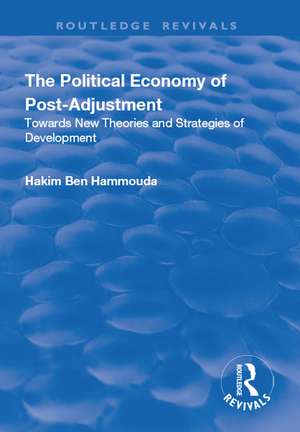The Political Economy of Post-adjustment: Towards New Theories and Strategies of Development: Routledge Revivals
Autor Hakim Ben Hammoudaen Limba Engleză Paperback – 11 noi 2019
| Toate formatele și edițiile | Preț | Express |
|---|---|---|
| Paperback (1) | 215.81 lei 43-57 zile | |
| Taylor & Francis – 11 noi 2019 | 215.81 lei 43-57 zile | |
| Hardback (1) | 627.67 lei 43-57 zile | |
| Taylor & Francis – 22 noi 2017 | 627.67 lei 43-57 zile |
Din seria Routledge Revivals
- 9%
 Preț: 767.40 lei
Preț: 767.40 lei - 9%
 Preț: 1004.17 lei
Preț: 1004.17 lei - 9%
 Preț: 934.94 lei
Preț: 934.94 lei -
 Preț: 230.80 lei
Preț: 230.80 lei -
 Preț: 294.72 lei
Preț: 294.72 lei -
 Preț: 258.66 lei
Preț: 258.66 lei - 9%
 Preț: 903.41 lei
Preț: 903.41 lei - 18%
 Preț: 695.85 lei
Preț: 695.85 lei -
 Preț: 296.10 lei
Preț: 296.10 lei -
 Preț: 342.36 lei
Preț: 342.36 lei - 9%
 Preț: 606.35 lei
Preț: 606.35 lei -
 Preț: 309.94 lei
Preț: 309.94 lei - 9%
 Preț: 729.99 lei
Preț: 729.99 lei -
 Preț: 256.94 lei
Preț: 256.94 lei -
 Preț: 230.80 lei
Preț: 230.80 lei -
 Preț: 259.47 lei
Preț: 259.47 lei - 9%
 Preț: 903.80 lei
Preț: 903.80 lei -
 Preț: 153.81 lei
Preț: 153.81 lei -
 Preț: 258.66 lei
Preț: 258.66 lei -
 Preț: 294.91 lei
Preț: 294.91 lei -
 Preț: 200.66 lei
Preț: 200.66 lei -
 Preț: 199.85 lei
Preț: 199.85 lei -
 Preț: 308.78 lei
Preț: 308.78 lei -
 Preț: 295.04 lei
Preț: 295.04 lei -
 Preț: 382.23 lei
Preț: 382.23 lei -
 Preț: 258.66 lei
Preț: 258.66 lei -
 Preț: 343.21 lei
Preț: 343.21 lei - 9%
 Preț: 640.90 lei
Preț: 640.90 lei - 9%
 Preț: 605.71 lei
Preț: 605.71 lei -
 Preț: 228.88 lei
Preț: 228.88 lei -
 Preț: 257.67 lei
Preț: 257.67 lei -
 Preț: 245.10 lei
Preț: 245.10 lei -
 Preț: 258.52 lei
Preț: 258.52 lei - 5%
 Preț: 231.22 lei
Preț: 231.22 lei -
 Preț: 368.93 lei
Preț: 368.93 lei -
 Preț: 246.37 lei
Preț: 246.37 lei - 9%
 Preț: 764.34 lei
Preț: 764.34 lei -
 Preț: 258.66 lei
Preț: 258.66 lei -
 Preț: 326.26 lei
Preț: 326.26 lei -
 Preț: 286.98 lei
Preț: 286.98 lei - 8%
 Preț: 418.23 lei
Preț: 418.23 lei -
 Preț: 260.85 lei
Preț: 260.85 lei -
 Preț: 267.15 lei
Preț: 267.15 lei -
 Preț: 295.62 lei
Preț: 295.62 lei -
 Preț: 262.64 lei
Preț: 262.64 lei - 9%
 Preț: 638.61 lei
Preț: 638.61 lei -
 Preț: 341.55 lei
Preț: 341.55 lei -
 Preț: 381.17 lei
Preț: 381.17 lei -
 Preț: 294.53 lei
Preț: 294.53 lei -
 Preț: 294.72 lei
Preț: 294.72 lei
Preț: 215.81 lei
Preț vechi: 258.52 lei
-17% Nou
Puncte Express: 324
Preț estimativ în valută:
41.30€ • 42.86$ • 34.52£
41.30€ • 42.86$ • 34.52£
Carte tipărită la comandă
Livrare economică 17-31 martie
Preluare comenzi: 021 569.72.76
Specificații
ISBN-13: 9781138713970
ISBN-10: 113871397X
Pagini: 236
Dimensiuni: 150 x 216 mm
Greutate: 0.44 kg
Ediția:1
Editura: Taylor & Francis
Colecția Routledge
Seria Routledge Revivals
Locul publicării:Oxford, United Kingdom
ISBN-10: 113871397X
Pagini: 236
Dimensiuni: 150 x 216 mm
Greutate: 0.44 kg
Ediția:1
Editura: Taylor & Francis
Colecția Routledge
Seria Routledge Revivals
Locul publicării:Oxford, United Kingdom
Cuprins
1 The Failure of the Washington Consensus 2 Structural Adjustment and the Asian Model 3 The Orthodoxy and Post-Adjustment 4 Heterodoxy and Post-Adjustment 5 Towards a New Post-Adjustment Development Strategy 6 Regulation and Post-Adjustment Theories
Descriere
This title was first published in 2003. Hammouda's text focuses on modernization experiences in the South which, in the 80s had reached their limits, with the adoption of structural adjustment programmes in most countries. Yet, such Washington Consensus inspired programmes met difficulties in initiating new growth dynamics in these countries and in improving their international insertion. Hence, a new era termed post-adjustment by the author has been ushered in, one which is characterized by a decline of structural adjustment programmes and through dynamic and plural research, is striving to introduce new theoretical practices and development strategies. This book is a contribution to such debate.






